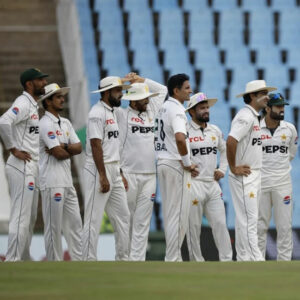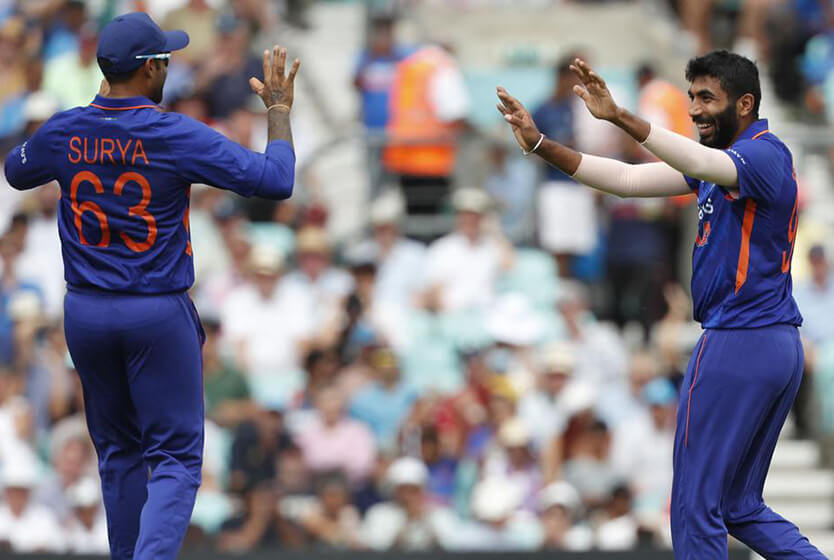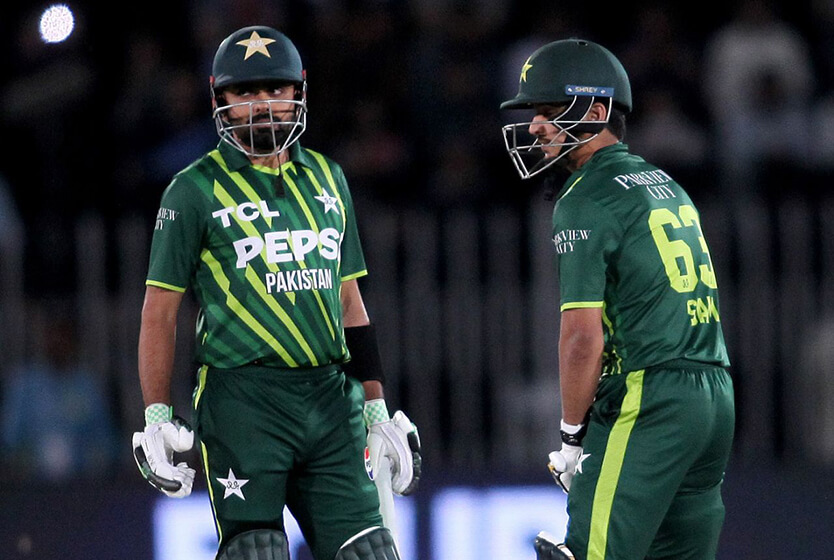
Farewell, Azhar Ali – A Pakistani Cricketer Like No Other
A tribute to the former captain who retired after 97 Tests with 7142 runs to his name, the 5th-highest for Pakistan.
How do we define a hero in sports?
A few days ago, the little boy from Rosario conquered the World Cup and accomplished a lifelong dream, becoming a hero for millions more in addition to the masses that already idolized him. Lionel Messi is an unquestionable sporting hero. A GOAT.
Less than 3 months ago, the Swiss Maestro called it a day, bidding farewell to the highest level of tennis, demonstrating a reality that everyone recognizes but doesn’t want to accept. That day saw his biggest rival bawling his eyes out at his side. Roger Federer is another hero and GOAT.
More pertinent to this article’s audience is the local hero who retired 30 years ago from the sport we all love after achieving a dream for his nation – something that his countrymen have failed to replicate since then. Imran Khan was Pakistan’s own GOAT.
Some heroes are different. They aren’t GOATs. They don’t have the aura of invincibility. In the words of Shoaib Akhtar, they don’t have the daleri or badmaashi on the field. They aren’t always the most pleasing to watch – they might be the opposite. But as Batman said, “A hero can be anyone. Even a man doing something as simple and reassuring as putting a coat around a young boy’s shoulders to let him know the world hadn’t ended.”
That young boy was a legion of Pakistan cricket fans in 2010. Fans that had seen their dreams torn apart to shreds just a year after winning a major trophy. Fans who were first deprived of cricket at home and were now to witness their heroes being disgraced and imprisoned. Fans that lost hope and were on the brink of giving up the sport they grew up loving.
Enter Misbah-ul-Haq and his men. A group of primarily hard-working players without the flair of those of yesteryear. That may have been necessitated by the paucity of available resources, and it may have also been enforced due to the conditions in Pakistan’s adopted home. For the despairing young boy, though, none of it mattered. Slowly but surely, he felt the coat around his shoulders and appreciated that there may still be something to this sport.
Azhar Ali was no Younis Khan, hitting daddy hundreds year after year, nor was he Saeed Ajmal or Yasir Shah, bowling his side to enthralling wins against the world’s elite sides. But he was one of the most crucial players in that team, and he would go on to embody the values of Team Misbah like no other. A proper team man. A lovely human being. A guy all and sundry would like being around. Controversy-free, no fuss – and no spotlight.
Amidst this narrative, however, what is often lost is just how good a Test batsman he actually was.
Azhar was a slow starter. Slow to start his innings but, crucially, slow to start his series too. In the first/only matches of series, he averaged just 33.5. From the second match onwards, he averaged 48.3. He only ever hit 2 Test tons in the first matches of series; one being the 302* against West Indies and the other being his last century – 185 against Australia in Pindi.
Digging a bit deeper into his away record paints an even clearer picture. In the first Tests of away series, Azhar struggled. A lot. He averaged less than 22 in 25 Tests with just 5 fifties. From the second Test onwards, though, he averaged more than 48 in 33 Tests, with 10 hundreds and 11 fifties. Essentially, he went from averaging less than Wasim Akram with the bat (in 1st Tests of away series) to more than Ponting, Miandad, Root, and Inzamam (in 2nd Tests onwards). That’s an improvement of 123%. No one else in the last 50 years of Tests managed 70%, let alone anywhere close to 100% (minimum of 2000 away Test runs).
This isn’t the end of the story, though. See, playing almost anywhere else (particularly for the Big 3) would afford him the chance to make up for this. But not with Pakistan – 2-Test series are the norm and 3 a luxury. Azhar Ali played 97 Tests in 43 series (2.26 Tests/Series). Joe Root has played 127 Tests in 39 series (3.26 T/S). David Warner has played 99 Tests in 32 series (3.09 T/S). Virat Kohli has played 104 Tests in 37 series (2.81 T/S).
157 against England in Dubai. 157 in Colombo. 136 in Pallekele. 139 at Edgbaston. 205* in Melbourne. 127 in Dominica. 141* in Southampton. All these came in the 2nd and occasionally 3rd Tests of series. Only two series during his career consisted of 4 Tests.
In an equal world, Azhar, and indeed Pakistan, don’t face these obstacles. In a fairer arena, Pakistan play more extended series with better preparation beforehand. In a more equitable reality, Pakistani players don’t have to struggle with career-threatening injuries and travel to far-off lands to figure out what’s happening and why. But we’re not in that utopia – we’re in a reality where if Babar Azam plays all of Pakistan’s Tests until early 2027, he will be 32 going on 33 with less than 75 Tests to his name. On the plus side, he averages 45+ in the first Tests of series.
What does getting better as series go on show, though? England 2016 is a remarkable example. Pakistan hadn’t gone on a challenging overseas tour for a while, and Azhar struggled to adapt. He fell over in his stance, and his technique was taken apart. But he found a way at Edgbaston, as he usually did, and didn’t look back for the rest of that year. It shows the value of hard work, the ability to adapt to conditions, and how good he was at foiling opposition plans. Some amazingly gifted players don’t possess these admirable traits.
2013, 14, 15, & 16 were 4 of the top 7 highest-scoring years for a Test team in history with two middle-order batsmen aged 35+ at 4 & 5. India 2010 leads the list, with Sachin Tendulkar and VVS Laxman piling on the runs. How does a team with unstable opening combinations pull this off? The answer is Azhar Ali, as credited by Younis Khan himself in 2014. Taking the shine off the ball and wearing out the frontline bowlers are and will remain staples of Test cricket.
And so this Test team at its peak, which happened to coincide with the pinnacle of Azhar’s career, reached the summit of the Test rankings at Number 1. In a year where Pakistan are now setting new records for home Test losses, the significance of those achievements can’t be overstated.
When Younis and Misbah played till 2017, a new unrealistic expectation began to set in: that all batsmen could go on till 40 and keep making big runs. Yet, amidst the talk of Azhar’s decline, what is generally forgotten is that he turned 33 a few months after the two stalwarts called it a day – a period where some batsmen start declining. Now he could have retired then and there when he initially started having problems with his knee – with an average of 45+ to his name.
However, continuing then was arguably the right call, with Pakistan having few settled options at the top of the order. Most great batsmen continue beyond their peaks until their teams look a bit more settled with replacements in the pipeline. Their post-peaks are usually still better than what an undercooked replacement will manage.
Azhar did that and retired on the cusp of the 100-Test landmark, as usual showing complete disregard for a personal milestone ahead of the team’s interest. He finished with the 5th-most Test runs for Pakistan, laid a solid claim to being among Pakistan’s all-time ten greatest Test batsmen, and played a crucial role in an ICC tournament victory. Not bad for someone who was playing as a leg-spinner and batting at Number 9 in domestic cricket 17 years ago. Oh, and he never got to play at home during his peak.
The young boy has outgrown the coat. Test cricket is back home. Pakistan now has young world-class cricketers. The sun is shining. But at heart, he won’t forget the team that brought him out of the darkness and gave him hope when none was left. He won’t forget Azhar Ali, who was the true personification of that team. In the style of Ahmer Naqvi, I’m not a fan of Azhar Ali but a fan of those moments that show me the fruits of hard work. I’m not a fan of Azhar Ali but a fan of that time when I saw that nice guys do finish first. I’m not a fan of Azhar Ali but a fan of that person whom no one has ever had a negative thing to say about.
Three-time Grand Slam winner Arthur Ashe once remarked: “True heroism is remarkably sober, very undramatic. It is not the urge to surpass all others at whatever cost, but the urge to serve others at whatever cost.” In that sense, Azhar Ali is the definition of a true hero.







Leave a Reply